Showing 71–75 of 533 results
-
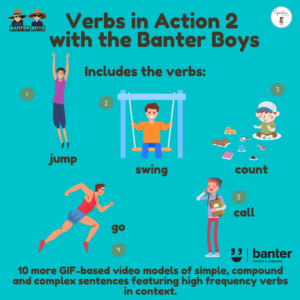
$5.99 including GST
10 more GIF-based video models of simple, compound and complex sentences featuring high frequency verbs in context and the Banter Boys. The verbs featured in Volume 2 are: put, jump, call, swing, close, bounce, go, count, get, and fight.
Verbs are all about actions. A great way to teach high frequency verbs in sentences is with pictures that move: GIFs!
In this resource, we include GIFs of children demonstrating high frequency verbs in action. To play the GIFs, copy the slides onto your Google Drive.
For each video-model, we scaffold four examples of different kinds of sentences you can use to model language with each GIF, e.g.:
- Subject Verb (SV) Sentences: “The boy is jumping.”
- Subject Verb Adverbial (SVA) Sentences: “The boy is jumping up and down.”
- Simple Infinitive: “The boy is jumping to stay fit.”
- Complex Sentences: “The boy is jumping because he is happy.”
-
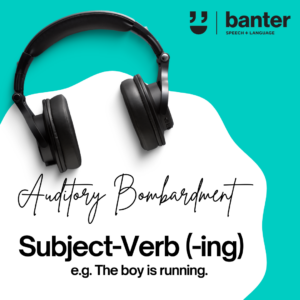
$3.99 including GST
Some children have difficulties putting their words into the right order in sentences, for instance, subject-verb sentences like “The boy is running.”.
In this audio recording, children can listen to sentences about what people are doing.
For this grammar goal, we provide a short .m4a recording and a script with pictures, so that, daily, children can:
- simply listen to the recording as they play nearby or sit in the car;
- listen to our recording as they look at the pictures; or
- have a family member read the script to the child in a shared reading format.
-
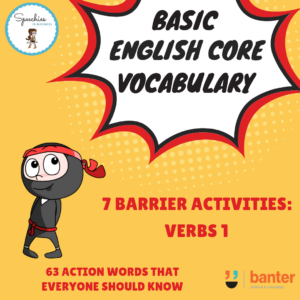
$4.50 including GST
In this 13-page low-prep pack, the barrier stimulus worksheets are designed to help participants develop their Basic English core vocabulary of verbs. Designed for people learning English as a Second Language, and for children with developmental language disorders, the words depicted in the Barrier Games have been selected from the New General Service List-Spoken 1.2, a list of 721 words accounting for up to 90% of spoken English (Browne & Culligan, 2017, NGSL-S1.2).
-
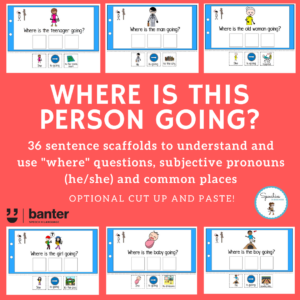
$5.99 including GST
This 40-page no preparation pack contains 36 sentence scaffolds to help people to practice answering (and asking) “where” questions and to answer “where” questions using “he” and “she”. To vary the activity, you can also cut up and paste individual sentence scaffolds in the available space.
The scaffolds also include common places to help stimulate semantic language development and background knowledge of places, as well as some ideas for day trips!
-
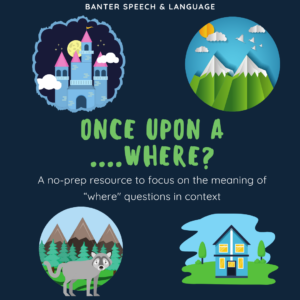
$6.99 including GST
This 45-page no-prep resource is designed to help children understand and use simple ‘where’ questions in context.
Set in an engaging world of fairy tales, this resource is designed to highlight the meaning of ‘where’ with the support of familiar concrete storybook locations (e.g. a house, forest, cave, castle, hill, river, and hill).





